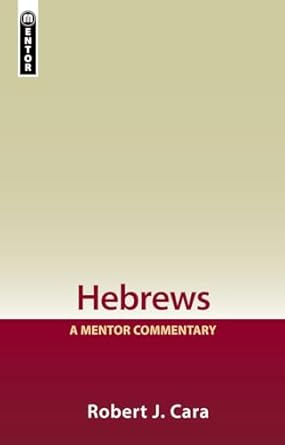A Book Review from Books At a Glance
by Michael D. Mock
One of the more difficult but more rewarding books in the New Testament is Hebrews. I recall the late Dr. R.C. Sproul once said that if he was allowed only one book of the Bible, being stranded on an island, it would be the book of Hebrews. To be without a helpful commentary makes reading, studying, teaching, and preaching from Hebrews even harder and less rewarding. Cara’s commentary makes the experience of knowing Hebrews easier and exponentially rewarding. This commentary is certainly not the longest of its kind, nor the most exhaustive. John Owen’s volumes have earned those descriptions. However, Cara’s depth of research blends seamlessly with his economy of words. In 567 pages of actual commentary, Cara brings the student of Hebrews into conversation with intertestamental studies, sound exegesis, historical church interpretations, confessional and creedal connections, modern debates, and practical application.
Cara’s prefatory remarks clarify his intended audience. Of course, his interest is for the edification of the whole Church, but his focus is the pastor or professor, and even more narrowly, one who has deep-seated appreciation with Reformed theology (xvii). This commitment to the Reformed faith is evident in his interpretative decisions (though not blindly agreeing with his beloved tradition) and in his regular referencing or quoting men from the Reformed tradition. He regularly interacts with John Calvin, John Owen, Charles Hodge, and others whose hermeneutical reputation is well-known and whose literary products have blessed many for centuries.
One of the distinctive features of his commentary is his confessional, catechetical, and creedal consciousness. Cara does not read Hebrews in the light of the creeds, confessions, and catechisms, but he will often draw from them as a reminder or an explicit connection for those with a similar mindset. As a professor in the ARP, he has his own subordinate standards, but he does not feel beholden to quoting only those of his particular denomination. The Westminster Confession and its accompanying catechisms take the lion’s share of his confessional referencing. However, Cara will regularly point the student to the Belgic Confession, the Canons of Dort, the Nicene Creed, the Irish Articles, the Heidelberg Catechism, and to a few others. This was a refreshing feature in the commentary, especially as I am regularly trying to make biblical-confessional connections in my ministry of Scripture.
To return to Cara’s commitment to the Bible as expressed in the Reformation tradition, another refreshing feature to see is Cara’s unapologetic conviction of sola Scriptura and his healthy skepticism of modern, Enlightenment-influenced thinking, the kind that is too often suspicious of long-held, biblically based faith-commitments. For instance, Cara doesn’t countenance the discussion of the canonicity of Hebrews. He takes the book’s canonical status for granted, as a biblical presupposition (1). This approach spares the student probably a good 50 pages, and all the pastors say, “Amen.” Cara, mercifully, leaves out the extraneous matters that are rightly taken up elsewhere (monographs, essays, journal articles, technical and exhaustive commentaries, etc.). This kindness keeps his commentary quite manageable, especially for busy professors and pastors who desire well-studied, direct, and clear commentary.
The previous paragraphs, however, should not be understood as Cara not doing his homework. As Cara proceeds through the commentary and tackles theological and exegetical decisions, as he enters the great hermeneutical conversation, he shows himself to be well-read, clear, and economical with his words. He will normally introduce his view, defend his decision, and offer helpful references from all sides of the issue.
Perhaps especially noteworthy is Cara’s character. As he engages all the “hot topics” of Hebrews (e.g., the identity of the author of Hebrews, classic texts inviting controversy like Heb. 6 or Heb.10, how to understand Rahab’s deception or Jephthah’s vow), he demonstrates both a humble and an irenic spirit. When Cara is undecided, he eschews dogmatism. When he disagrees with others, he cites this disagreement with a posture that strives after peace with all men. I did not agree with Cara on everything, but my views were challenged, represented well, and were given a fair shake. No straw men were raised then razed in this commentary.
Finally, his shepherd’s heart came through in every chapter, and in many sub-sections of every chapter, throughout the commentary. His “Reflections” section was regularly practical and always doxological. Cara’s commentary, in sum, demonstrates through and through the heart of the message of Hebrews: Jesus Christ is his God, the righteous God-Man, his all-sufficient mediator, and perfect prophet, priest, and king. Jesus is better. Read Cara’s commentary to see how “better” Jesus really is!
Michael D. Mock
